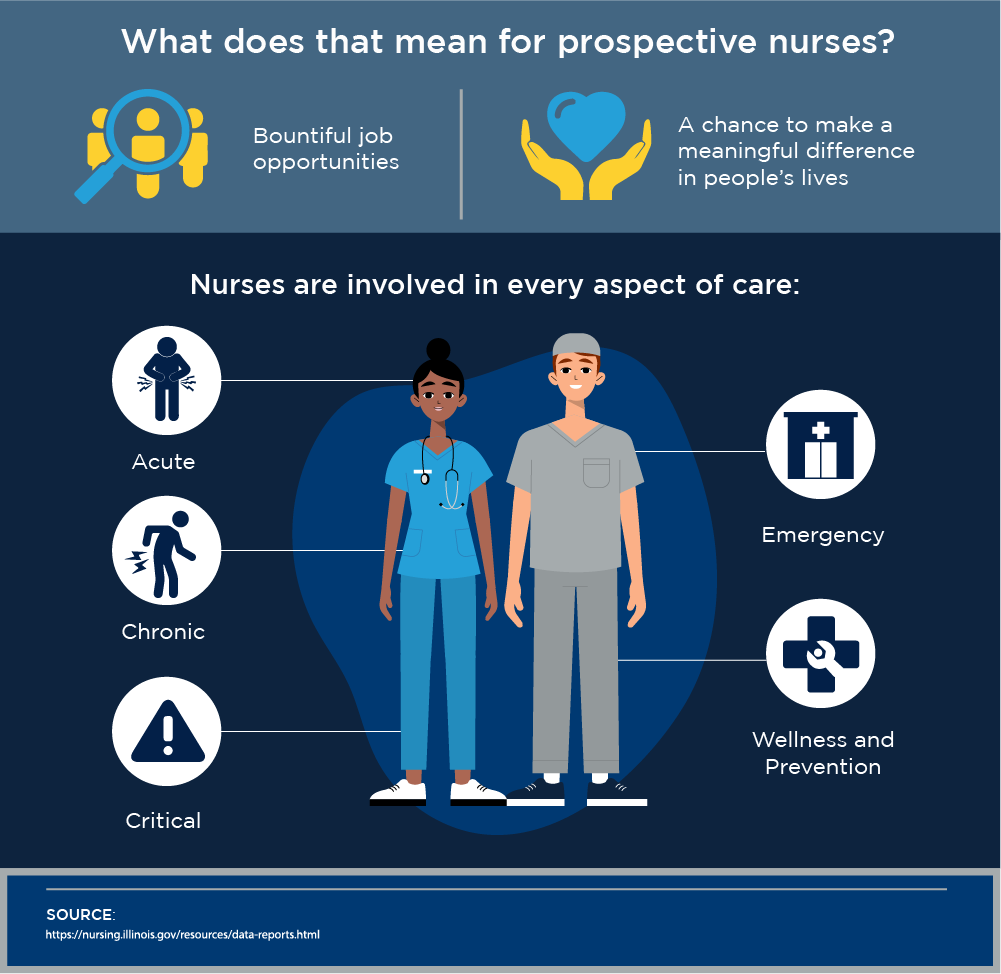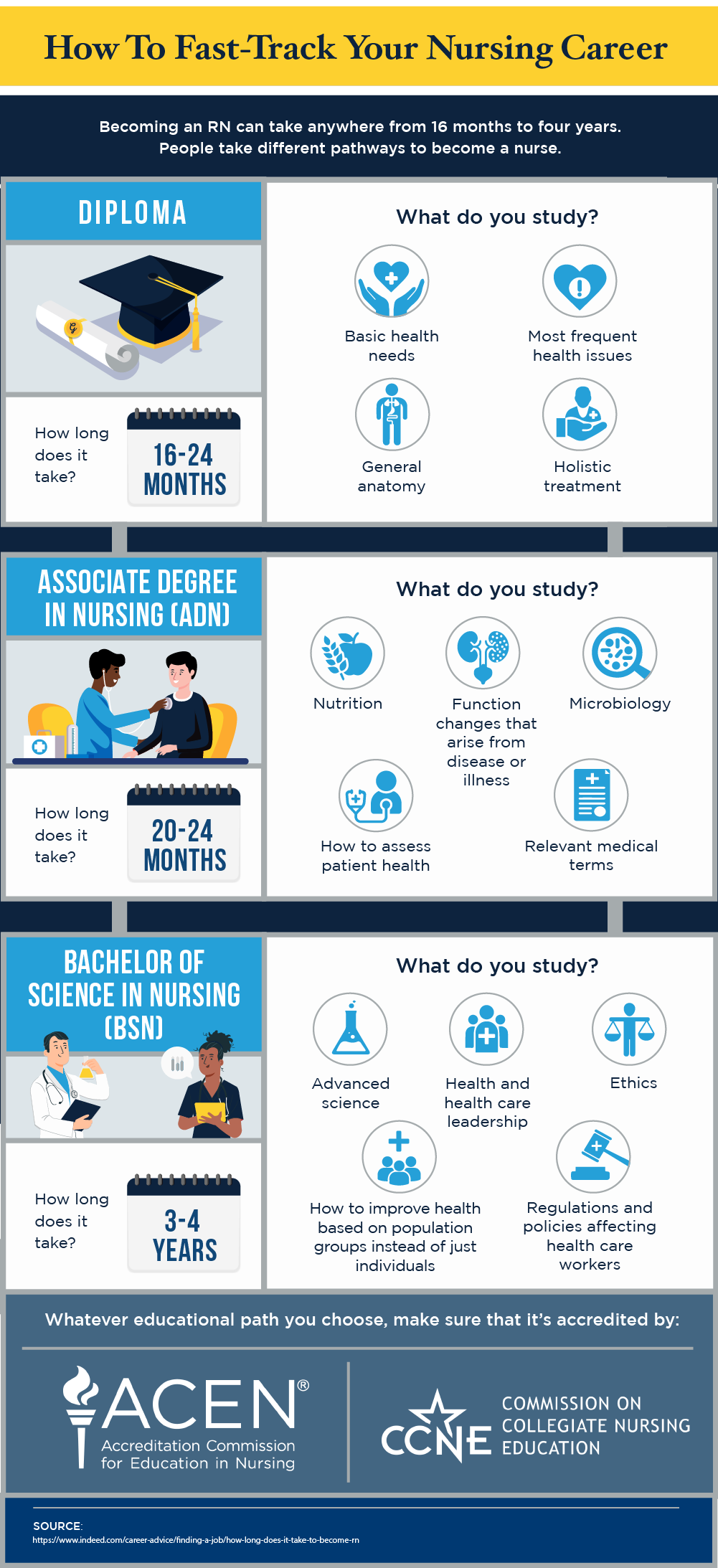What Is the Fastest Way to Become an RN?

This article was last updated on March 19, 2025.
As the nursing shortage in the United States intensifies, an unprecedented number of opportunities have become available at the forefront of health care. According to the American Association of Colleges of Nursing, there are over 4.7 million registered nurses in the U.S. workforce, and it’s expected we’ll need approximately 203,000 more Registered Nurses (RNs) each year to meet demand by 2032. Combine this growth with the imminent retirement of about one-quarter of the nation's nurses fast-track nursing programs are a vital component in safeguarding our future.
If you’ve ever considered becoming a nurse or are currently working in health care and want to advance your career, now is the ideal time to start that journey. Nursing schools are offering more convenient and accelerated class options making it easier for people to swap professions.
Jump to: The Fastest Pathway to Becoming an RN
Why Consider Nursing as a Second Degree
You can become a nurse at any age, whether you've thought your first degree wasn't the right fit or you're seeking a more fulfilling career path.
Nursing draws people to the field for many reasons, but the most compelling motive is the opportunity to give back to society. If you've been working for a while, you might be pleased to hear that the education industry has evolved since your college days. Thanks to technology, nursing programs are more convenient than ever before.
Because of this, more and more people are going back to school to pursue nursing. A job change can happen for many reasons and nursing is a great choice for people seeking a field with various specialties and career options.
Nursing can be highly challenging, but entering as a second-career nurse means you’re bringing years of experience to a different field. This can offer a new perspective and unique insights to the health care system as a whole.
It is never too late to go back to school—especially with the variety of flexible program structures that make it easier to balance home life and other time commitments.

Why Choose Nursing as a Career
Nursing is a fast-paced and in-demand field. The profession offers many benefits to people who enjoy helping others.
Flexible: Nurses work eight, ten, or twelve-hour shifts or a combination of all three. Some are able to set their schedule in a way that allows them to work while their children are in school or match their partner’s hours to maximize their time off together. Some nurses work standard M-F 9-5 hours and some are even employed in remote-based positions. In many environments, you are working with various other nurses. This means trading shifts or getting shifts covered is usually not an issue.
Job Opportunities: Nurses have the amazing chance to work in a multitude of settings. Nurses are fortunate to have essential skill sets that are valued in any economy and have options to pursue nursing roles in varied work environments.
Making a Difference: Nurses have the opportunity to make a positive impact on patients lives with every interaction. Thanks to the life-changing work they do every day, nurses build a stronger community by empowering patients to take charge of their health. A major role that nurses play is in their continued advocacy for patient safety and the empowerment of patients to care for themselves as much as possible.
LPN vs. RN
When people think of nursing, RN usually comes to mind. Another important credential is LPN, which stands for licensed practical nurse. Despite their different roles each plays a distinctive part within the healthcare system.
While the scope of practice varies by state license, they all share certain similarities. To stay up-to-date on the scope of practice in the state you intend to pursue licensure, it is best to consult with the individual state board of nursing you wish to practice in. For now, let’s take a look at both options to see which one makes the most sense for you.
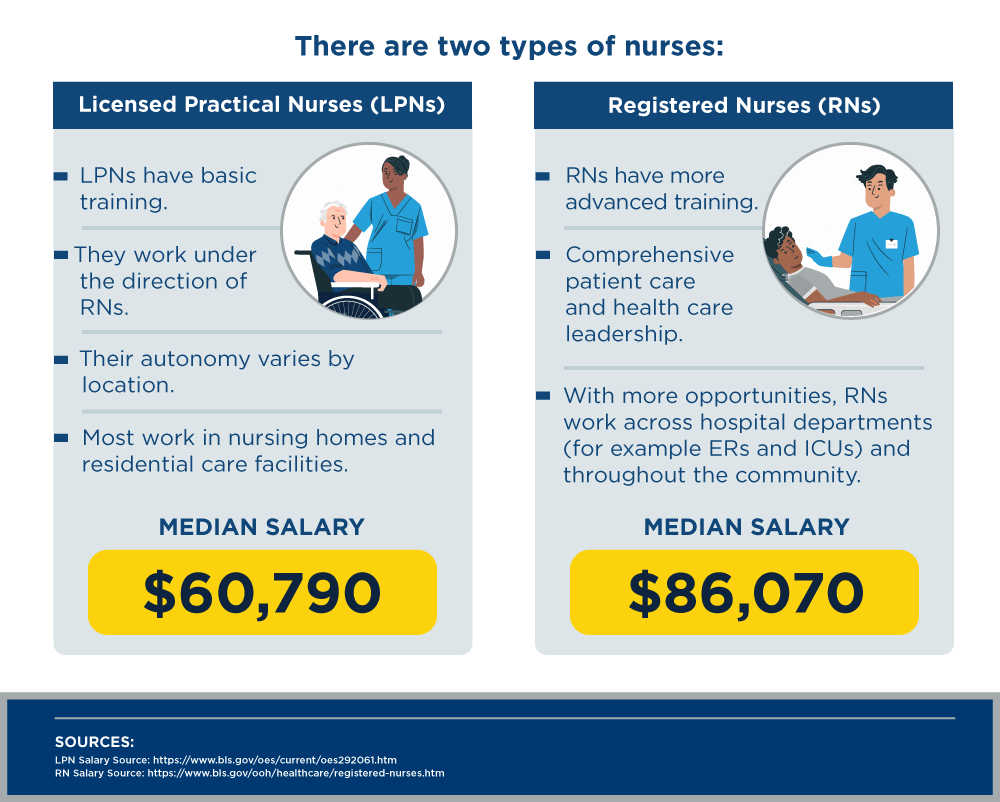
Roles and Responsibilities of an LPN
Skills and Responsibilities: LPN nurses' responsibilities and skill sets will depend greatly on where they practice and where they are licensed. Certain areas give LPNs much more autonomy, allowing them to start and independently administer certain medications intravenously. Conversely, some states only include PO medications within the LPN scope of practice, while others designate certain classes of medication off-limits.
Job Opportunities: The state in which an LPN works and the scope of their practice will determine where they are employed. Nursing homes and residential care facilities today hire the majority of LPNs. In some states, LPNs can work in an emergency room and acute care setting mainly in states where LPNs are able to administer IV medications.
Pay: The median income for LPNs is $60,790 in 2023, which equated to about $29.23/hour for full-time workers. Most LPNs are employed in full-time positions that offer full benefits and insurance packages.
Roles and Responsibilities of an RN
Skills and Responsibilities: RNs are responsible for assessing patients' changing conditions and keeping members of the medical team informed, as well as monitoring and interpreting vital signs in conjunction with patients’ health history. In addition to starting IV access and administering medications, nurses educate patients, exhibit strong communication skills and manage the overall safety and well-being of each patient.
Job Outlook: RNs have the opportunity to work in many different areas. The majority of nurses are employed in acute care settings, such as emergency rooms, intensive care units or specialty units of the hospital. But hospitals are not the only facilities that employ RNs. Outpatient surgery centers, infusion centers, doctor's offices and home health agencies are just a few examples of common places that hire RNs.
Pay: In 2023, RNs earned an average salary of $86,070 per year. This amounts to $41.38/hour for a typical 40-hour work week. Most RNs are employed in full-time positions with full-time being defined as 36-40 hours per week depending on your employer. Full insurance and retirement benefits are standard for full-time and some part-time RN positions.
There is also the opportunity to work in part-time or per diem jobs that typically pay more per hour but do not offer benefits.
After deciding whether you are interested in pursuing an RN or LPN degree, you can then choose an avenue to accomplish your goal. There is no one-size-fits-all approach to becoming a nurse. We will now focus on a few of the most popular paths to becoming an RN.
Pathways to Becoming an RN
To determine which route would be ideal for you, consider whether you learn best in a classroom setting or online. Something as small as the environment you learn in could make or break your chance at becoming an RN so keep these factors in mind when choosing which programs to apply to. Understanding all of your options will allow you to decide how soon you enter the workforce. You can fast-track your journey to become an RN and knock two years off your study.
An associate's degree in nursing (ADN) or a bachelor's degree in nursing (BSN) are the two most common fast-track options. Both ways do require you to pass the NCLEX-RN licensure examination post your degree.
ADN and Related Programs
The way to become an RN with the lowest level of education is to go through an associate’s degree in nursing or ADN program. Most ADN programs are two years long and are held at community colleges. There are numerous options to choose from, including part-time and full-time programs.
Full-time programs typically last two years and follow a regular college schedule with winter breaks and summer holidays. Part-time ADN programs are often available, which usually offer fewer classes per semester with a longer overall program length and fewer breaks.
Since many job postings prefer to hire only BSN-prepared nurses, and it is correlated with improved patient outcomes, it is increasingly recommended to choose to pursue a BSN straight away. Those who already hold a bachelor's degree may be eligible to get a Bachelor of Science in Nursing (BSN) in under two years.
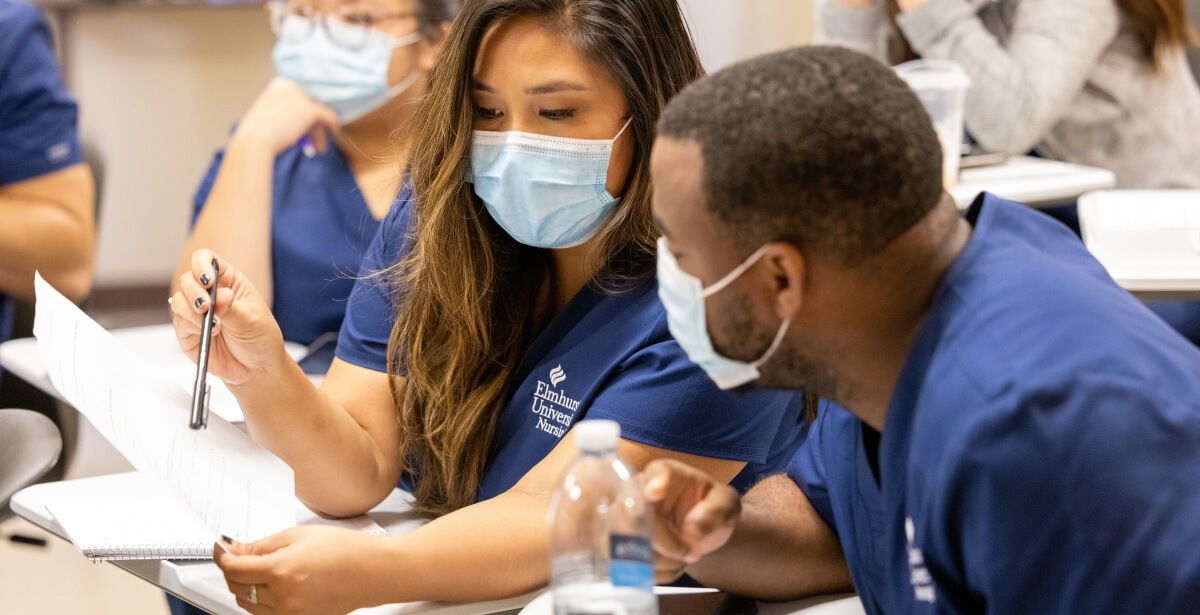
BSN and Related Programs
Traditional BSN programs are four years long and take place on campus at universities. There are also part-time programs, which offer students more flexibility, as mentioned above with most ADN programs.
For those who want to become an RN as soon as possible, there are accelerated BSN (ABSN) programs that allow you to graduate in as little as 16 months. For second-degree nurses, an ABSN program might be a good option.
With a bachelor’s degree obtained prior to acceptance, an ABSN program will leverage existing coursework to accelerate the completion of this nursing degree.
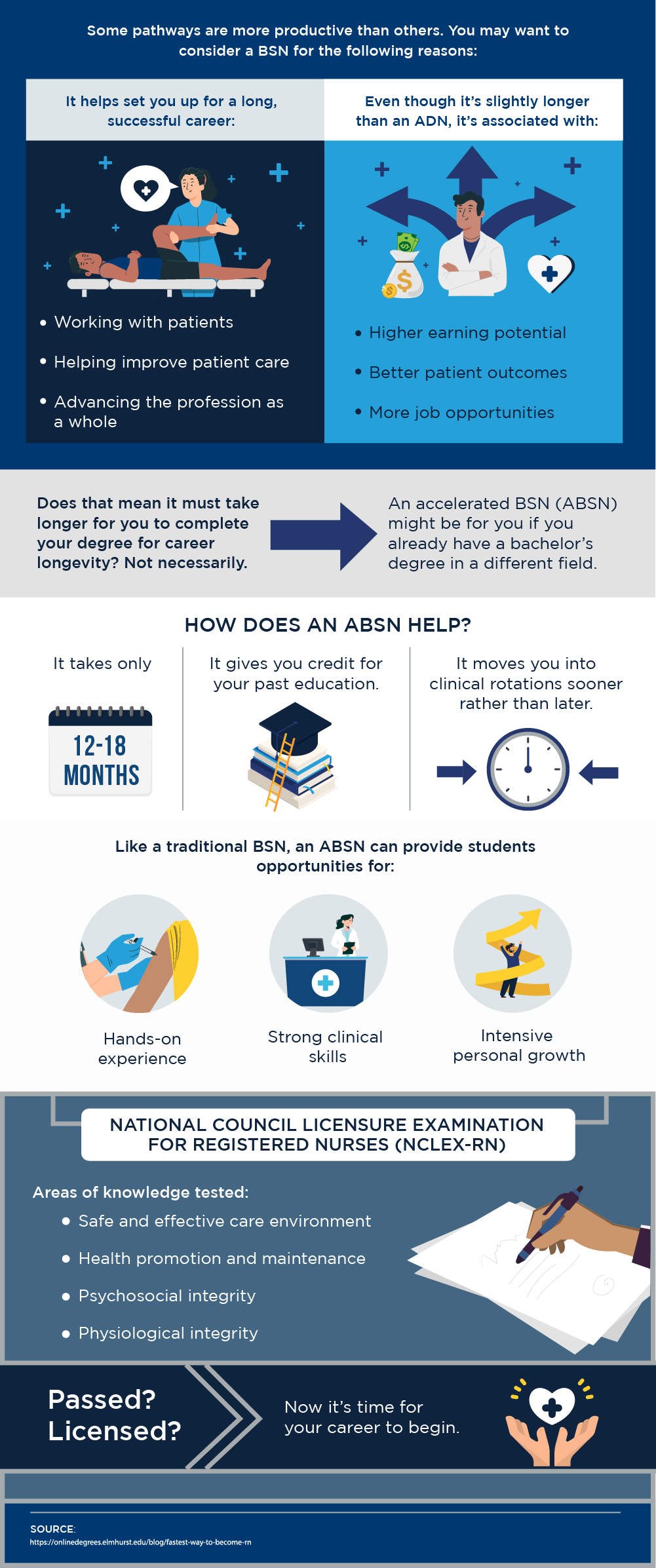
Direct-Entry MSN and Related Nursing Programs
For those who know that leadership and health care management is the direction they want to take, a direct-entry master’s of science in nursing (MSN) program may be the best option. A person with little to no work commitments and a considerable amount of free time to devote to coursework is an ideal candidate for this fast nursing program.
Similar to ADN and BSN programs, this MSN program can be completed in as little as 20 months and will prepare you for the NCLEX-RN licensure exam.
With online direct-entry MSN programs, all of the program coursework is completed online from the comfort of your own home, which is beneficial for someone who works well in an online classroom setting. However, clinical placement and residency hours do occur outside the home, so do be aware of that.
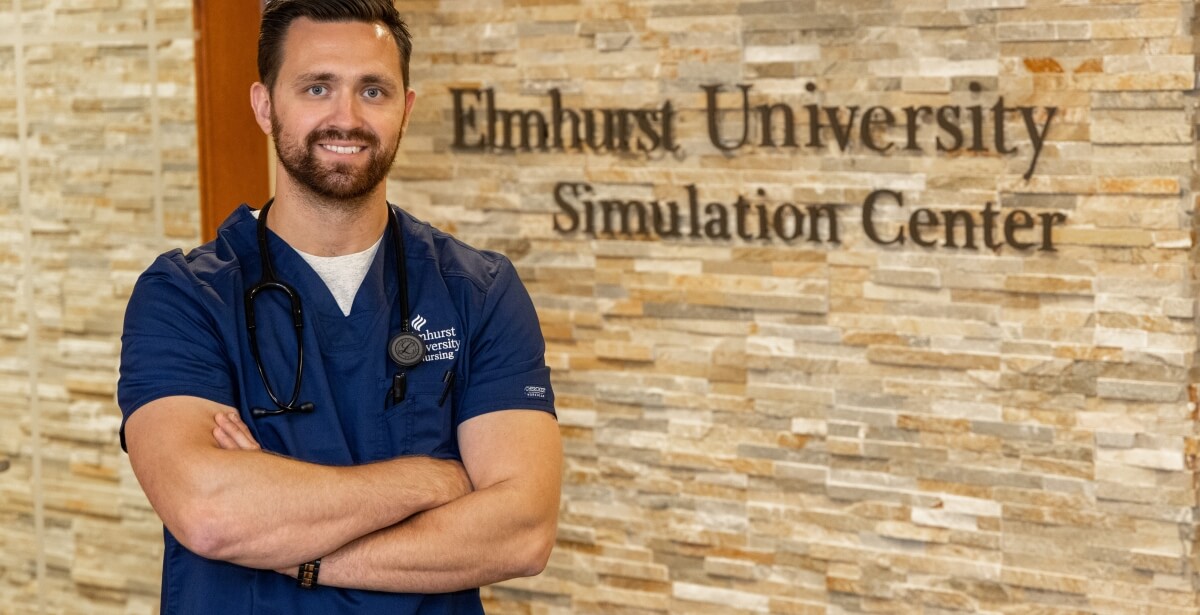
Fastest Way to Become An RN
Are you looking for fast nursing programs? Look no further than Elmhurst's ABSN and MENP Programs.
The online ABSN program at Elmhurst University will help you solidify your skills and knowledge for a career as an RN in just 16 months.
The online Master's Entry in Nursing Practice (MENP) program at Elmhurst is also one of the few that can be completed in less than two years, taking you from a bachelor's degree in another field to an MSN in just 20 months.
Through our hybrid nursing programs, you'll complete all coursework online, while gaining crucial hands-on experience through one or two on-campus residencies and clinical placements in your local community.
Learn whether the accelerated BSN or MSN program is right for you
